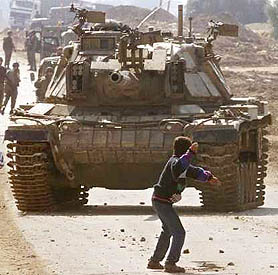Hermeneutics is the art and science of the study of theology and the practice of interpretation. Hermeneutics is an art that requires creativity and imagination, and it is a science that requires sound methodologies. But the art and science of hermeneutics is not neutral. The second chapter (“A Prelude to a Palestinian Narrative”) of Mitri Raheb’s bookFaith in the Face of Empire: the Bible through Palestinian Eyes lays out a brief history of the way that Christian hermeneutics in Europe and America in the years since World War II have been used to support the occupation and oppression of Palestine.
This hermeneutic
operated by consistently interpreting scripture in such a way as to dismiss and
diminish the Palestinian people. “On the
one hand, we are viewed as the Canaanites or the descendents of Ishmael, which
means theologically we are inferiors and politically second-class citizens. Ishmael then gets connected Arabs, and
Muslims, who are viewed with an Orientalist lens, and, after 9/11 with fear and
hatred as well. On the other hand, our history,
our roots, and our presence in the Holy Land are glaringly overlooked so that
we become aliens and strangers, and this by divine order (38).”
However, this state of affairs is changing, says Raheb. For the first four decades after World War II and the establishment of the state of Israel in 1948, Palestinians may have lost their voice but beginning in the 1980s with an increased interest in post-colonial studies they began to assume the responsibility for making changes, challenging the dominant culture, and questioning that omnipresent myth of Judeo-Christian tradition (27).
He also credits the first
Intifada (“Uprising”) in `1987 for drawing the world’s attention to flaws in
that narrative. The world saw the brutal
response of Israel to a (mostly) non-violent movement and the blinders began to
fall away. How can we reconcile the
story of little David (Israel) fighting the giant Goliath (the Arab world) to
the pictures of a young Palestinian boy with a stone in his hand facing a high-tech
Israeli tank? How do we reconcile the memory of the Jewish people as the victim
of persecution with the way the state of Israel victimizes the Palestinians
(30)?
Raheb also notes the
voices questioning this legitimizing myth from outside Palestine – Jewish theologians
like Shlomo Sand of Tel Aviv University
who describes the way “the concept of a
Jewish homeland was invented by evangelical Christians together with Jewish Zionists to facilitate the
colonization of Palestine (33),” and Christian theologians like Walter
Brueggemann who unveils the “national Israeli agenda behind the religious
packaging (35).”
It is a brief chapter (in a small book) but it does much to disturb. We cannot blindly and unquestioningly accept a hermeneutic that allows the dehumanization of the Palestinian people.
It is a brief chapter (in a small book) but it does much to disturb. We cannot blindly and unquestioningly accept a hermeneutic that allows the dehumanization of the Palestinian people.
[i]
Raheb, Mitri, Faith in the Face of Empire: The Bible through Palestinian
Eyes, Orbis Books, Maryknoll, NY, 2014.



Just to prove the point, and relate the current story of Noah,
ReplyDeletehttp://americanvision.org/10440/aronofskys-noah-a-panoply-of-jewish-paganism/#sthash.QD2V2feN.dpbs
Note the comment,
"Ham is the bad guy. Ham is jealous. Ham is corrupt. Ham is equivocal. Ham is impetuous. Ham is the outcast, the loner, the rebel. Ham is the bad guy.
Now that is biblical. It is true. And it is a peculiar point to highlight and drive home constantly while trampling nearly all others. Peculiar, for it is the driving biblical justification for the Israelite genocides of the Canaanites. It is Ham’s rebellion for which his child, Canaan, is cursed. And it is Canaan’s children whom the Israelites later have to destroy utterly when taking the land as their possession."
The amazing thing, is that this guy has a PhD in Theology and believes this stuff!